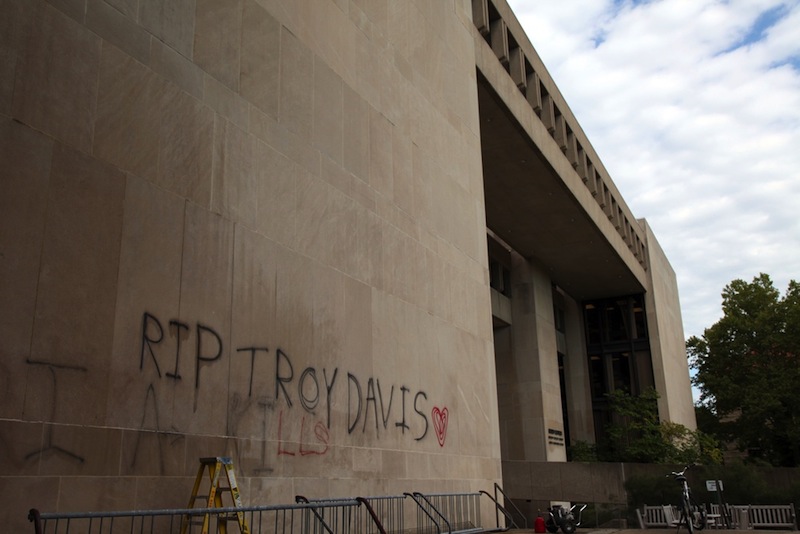Oberlin Remembers Troy Davis
Graffiti written on the side of the Mudd Center suggests that the execution of Troy Davis last week speaks to the endemic, institutional nature of violence and injustice in the U.S. prison system.
October 7, 2011
“Why wasn’t I on top of this?” “I felt so small last night.” “My heart is beating so fast.” “We can spray-paint a thousand walls…paint can be washed off.” “It makes me think, what’s going to happen when we leave this circle?”
These were some of the words spoken by students on Thursday, Sept. 22, at the Troy Davis vigil in Tappan Square. At 6 p.m., students began to gather, picking up candles and signs provided by members of the Oberlin College Prison Justice Project, some reading “RIP Troy Davis/Amerika Kills,” others “We Are Troy Davis.”
The vigil was called by the OCPJP to honor Troy Davis, whose long and contested murder trial ended Wednesday at 11:08 p.m. when he was executed by lethal injection in Savannah, Georgia. After being charged with the murder of Georgia police officer Mark MacPhail in 1989, Davis spent 22 years fighting to prove his innocence and to have his case overturned as a miscarriage of justice. Davis’s supporters, who ranged from groups like Amnesty International to thousands of ordinary people, asserted that the evidence against him was circumstantial, inconsistent and potentially the result of police and government coercion.
Davis’s story has become an emblematic case for critics of the death penalty and elicits great compassion from those who identify with his treatment. As OCPJP member and College junior Vera Tykulsker pointed out, many people have been imprisoned by unjust means or for unjust reasons— political ideologies or racial and socioeconomic status.
At the vigil, Tykulsker also identified a more personal connection attendees could have with Davis: “He went to jail when he was our age.”
“I could never say I knew him, or met him,” said College junior Tiesha Cassel to the circle of vigil witnesses, “but I cried … Our government looked at us last night and said I don’t care about your opinions. I don’t care if the law is equal for everyone.”
As the minutes passed, and as the circle of candle bearers expanded, other students shared similar feelings of grief. Many expressed the desire to act, emphasizing the larger meaning behind Davis’s death.
“I don’t know about you all, but this is just one more struggle we’re up against,” said College senior Vivian Gentry. “This is just one thing. America kills everyday … What the fuck are we going to do?”
Pamela Brooks, associate professor of African American Studies and faculty sponsor for OCPJP, commended student calls for action.
“I want to say how very, very proud I am to see you all here tonight. This is a wonderful, hopefully accurate, picture of Oberlin,” she said, her voice swelling to fill the circle. “One of the inspiring things about your generation is that you take some bit of action … you find movement in your emotions. I don’t despair when I look around me … Young people inspire.”
Brooks went on to encourage those present to “remind everyone you come into contact with of injustice” and to live meaningful lives. She described how expression through song had always been central to African-American struggles. In the spirit of her remarks, the circle soon broke into an impromptu version of “This Little Light of Mine” and, later in the evening, “Amazing Grace.”
The Prison Justice Project seeks to repair injustice in more concrete ways than vigil and song. According to Tykulsker, the organization currently participates in the Cleveland Books 2 Prisoners program and in activism based around queer and transgender treatment in prisons. Under Brooks’s direction, the group is also pursuing a potential educational initiative at the prison in nearby Grafton, Ohio.
In the day following Davis’s execution, Oberlin students responded with tears, anger, dialogue, graffiti and a candlelight vigil. One attendee of the vigil, however, suggested another possible response response when confronted with injustice: College senior Andres Feliciano said he sought “a sense of positivity and love.”
“Last night, I wanted to shout at everyone I knew,” he said. “There’s a reason riots happen… but all that’s left is broken glass.” He went on to paraphrase Albert Einstein: “You can’t destroy a system with the thing that created it … Love, that is the only way.”
















